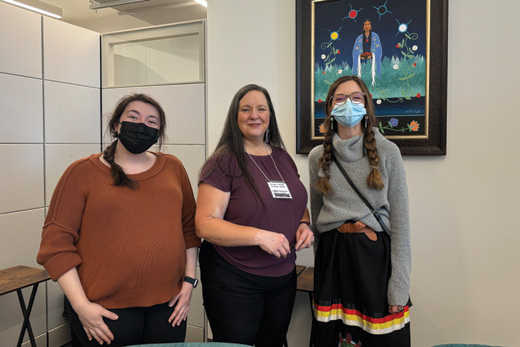At the new Center for Braiding Indigenous Knowledges and Science (CBIKS), housed at University of Massachusetts Amherst, more than 50 scientists — over half of whom are among the world’s leading Indigenous natural, environmental, and social scientists who represent Native American, First Nations/Métis, Native Hawaiian, Alaska Native, Māori, and Aboriginal peoples — will work cross-culturally to address some of today’s most pressing social and environmental concerns.
Through advancing knowledge on the local and global impacts of environmental variability on food and cultural systems, the center aspires to combat food insecurity, climate change, and the loss of traditional culture, which has been shown to impact Indigenous populations disproportionately.
In September, the National Science Foundation (NSF) announced a five-year, $30 million award toward the development of CBIKS, which operates as an NSF Science and Technology Center and will conduct research projects that connect Indigenous and Western knowledge systems to develop innovative solutions and provide new research methods, practices, and guidelines.
Sonya Atalay, CBIKS director and provost professor of anthropology at the University of Massachusetts Amherst, said, “It’s not as simple as just talking with Native people. It’s a fundamentally different approach to research, which requires building long-standing, trusting relationships.”

Western science tends to seek and apply universalities, whereas the approach taken up by CBIKS reflects thespecificity of place. Rather than separating subjects from their surroundings for the purpose of study, Indigenous practices emphasize the environment, humans, and plant, animal, and water relations. Indigenous sciences are managed by the community and consider cultural protocols and responsibility to care for and protect data and Indigenous knowledge.
“We … know that lands controlled by Indigenous people maintain much higher levels of biodiversity. We know that Indigenous peoples over millennia have been great stewards of the land and waters. There are very urgent practices and knowledge we can learn from Indigenous peoples about adaptation during the climate crisis, how to care for land and water, and how we maintain biodiversity,” said Atalay.
Trainings, workshops, and internships for graduate assistants, postdoctoral researchers, government agencies, and museum staff are some of the ways that CBIKS is embodying its theory in the community.
After-school programs and Indigenous science camps will serve K-12 students, the Indigenous Science Theater will weave art into the center’s STEM research, and the Indigenous Science Scholarship, along with a study abroad program, will provide research opportunities for students and community members. Two pivotal partners in these education efforts are the National Museum of Natural History and the National Museum of the American Indian, both in Washington D.C.
Once the five-year term of the initial award is complete, CBIKS will be eligible to apply for further NSF funding to continue their mission.
A list of partner institutions, Indigenous communities, researchers, and more information about the CBIKS can be found at umass.edu/CBIKS




















